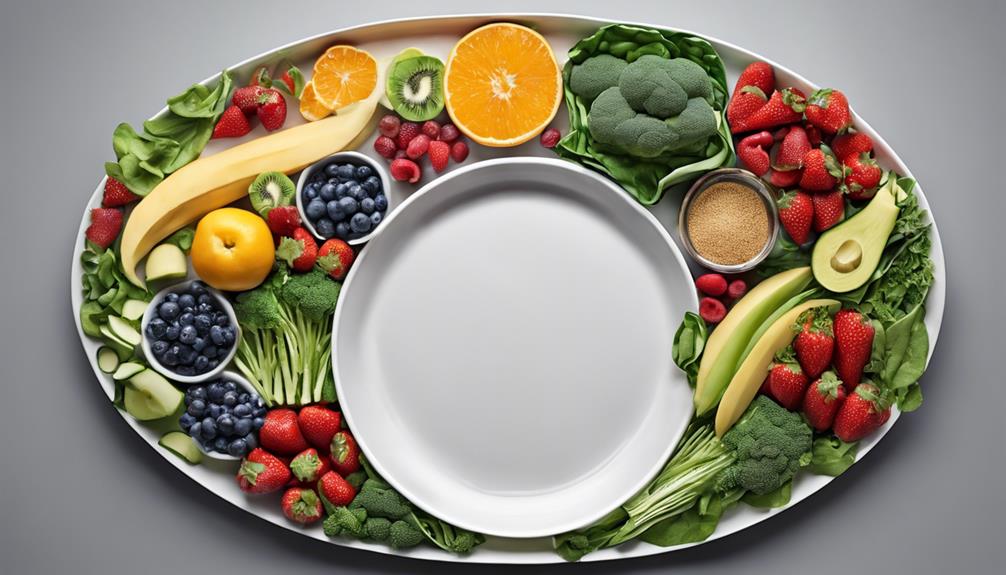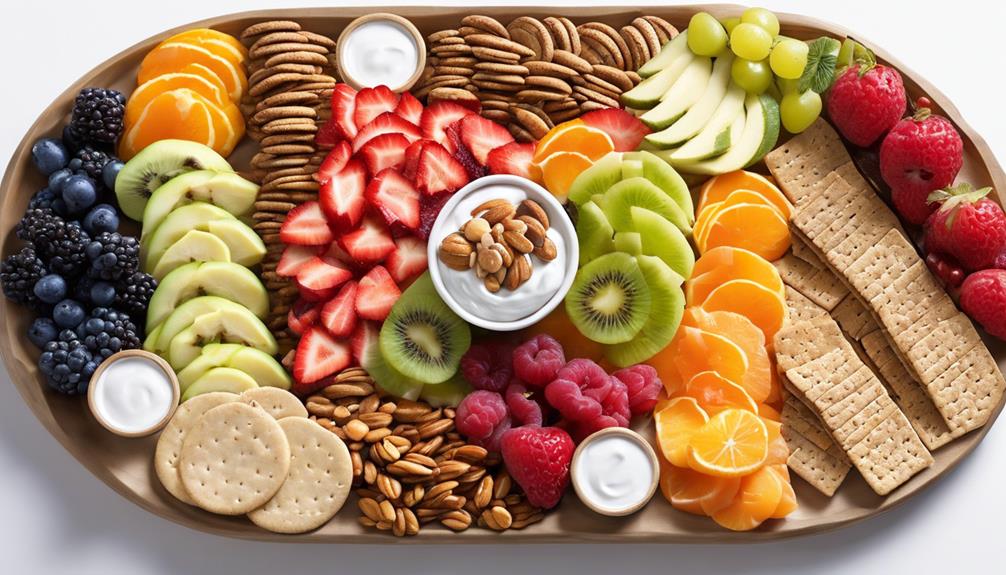As we dip our toes into the vast ocean of information surrounding a safe diet while breastfeeding, it becomes evident that maneuvering this territory can be as intricate as untangling a delicate knot.
The considerations and choices we make regarding what goes into our bodies during this critical time hold tremendous weight, affecting not only our own well-being but also that of our little ones.
So, how exactly can we guarantee that our nutritional choices align with the needs of breastfeeding? Let's explore some key insights and practical tips to guide us on this nourishing journey.
Key Takeaways
- Meet increased nutritional needs with balanced meals.
- Avoid alcohol, limit caffeine, and monitor baby's reactions.
- Include protein, healthy fats, and varied nutrients in diet.
- Stay hydrated, eat fruits, veggies, and whole grains for optimal health.
Nutritional Needs During Breastfeeding
During breastfeeding, we require additional nutrients to support milk production and maintain top health for both the mother and the baby. Breastfeeding increases calorie needs by 300-500 daily to guarantee an adequate supply of milk for the baby. Macronutrients such as carbohydrates, proteins, and fats play an important role in providing energy and aiding in tissue repair for the mother. A well-rounded diet rich in these macronutrients is important for overall health during this period. Additionally, micronutrients like vitamins and minerals are essential for supporting the immune system and various bodily functions.
It is crucial to pay attention to individual calorie requirements, which can vary based on factors such as weight, activity level, and metabolism. Ensuring a balance of nutrients not only supports the mother's well-being but also contributes to the baby's development and growth. Therefore, a diet that includes a variety of nutrient-dense foods is key to meeting the nutritional needs of both the mother and the baby during breastfeeding.
Best Foods for Breastfeeding Mothers

Eating nutrient-dense foods is essential for breastfeeding mothers to support their own health and provide ultimate nutrition for their babies. To guarantee optimal well-being during breastfeeding, consider incorporating the following foods into your diet:
- Iron-Rich Foods: Oats are a fantastic choice as they provide iron and energy-boosting complex carbohydrates, essential for combating postpartum fatigue.
- Lean Proteins: Include chicken and fish in your meals to supply essential amino acids necessary for tissue repair and growth, benefiting both you and your baby.
- Healthy Fats: Avocados and nuts are rich in healthy fats vital for infant brain development and can help keep hunger at bay for nursing mothers.
- Calcium-Rich Foods: Dairy products or fortified plant-based alternatives are excellent sources of calcium, essential for bone health in both you and your little one.
Foods to Avoid While Breastfeeding
To promote the health and well-being of both mother and baby, it is advisable to be mindful of certain foods to avoid while breastfeeding. Limiting caffeine intake to 2-3 cups per day can help prevent potential disturbances in the baby's sleep patterns. It's important to avoid alcohol consumption as it can pass through breast milk and negatively impact the baby's development. Some babies may be sensitive to strongly flavored or spicy foods consumed by the mother, which can lead to digestive issues. Additionally, be cautious of consuming fish with high mercury levels, as it poses risks to the baby's nervous system development. Pay close attention to your baby's reactions to foods in your diet and make necessary adjustments to guarantee their well-being.
| Foods to Avoid | Reasons | Tips |
|---|---|---|
| Caffeine | Disrupts baby's sleep patterns | Limit to 2-3 cups per day |
| Alcohol | Negatively impacts baby's development | Avoid completely |
| Spicy Foods | Can cause digestive issues in sensitive babies | Monitor baby's reactions |
| Fish with Mercury | Poses risks to the baby's nervous system development | Choose fish low in mercury levels |
Healthy Snack Ideas for Breastfeeding Mothers

For breastfeeding mothers seeking nourishing snack options, incorporating nutrient-rich foods like Greek yogurt with berries and honey can provide essential protein, probiotics, and antioxidants for sustained energy and gut health. Here are some healthy snack ideas to keep you fueled and feeling your best:
- Hummus and Vegetable Sticks: A crunchy and satisfying snack that offers fiber, vitamins, and minerals to support overall health and energy levels.
- Trail Mix with Nuts, Seeds, and Dried Fruits: A convenient and tasty option packed with healthy fats, protein, and energy for busy moms on the go.
- Whole Grain Crackers with Avocado or Nut Butter: A balanced snack providing fiber, healthy fats, and essential nutrients for lasting energy throughout the day.
- Cottage Cheese with Fresh Fruit or Whole Grain Toast: A calcium-rich choice that also offers protein and vitamins to support muscle function and overall well-being.
These snacks not only taste delicious but also provide the necessary nutrients to support your breastfeeding journey and overall health.
Tips for a Healthy Breastfeeding Diet
As we focus on maintaining a nourishing diet while breastfeeding, it is important to prioritize key nutrients that support both maternal health and milk production. Including protein-rich foods 2-3 times a day can aid in milk production and tissue repair. Consuming three servings of vegetables daily provides essential vitamins, minerals, and antioxidants vital for overall well-being. Two servings of fruit each day not only offer fiber and hydration but also supply vitamins necessary for you and your baby. Incorporating whole grains like whole wheat into your meals can provide sustained energy levels and additional fiber to your diet. Remember to stay hydrated by drinking water regularly; this not only quenches your thirst but also supports milk production. To make it easier to visualize, here's a simple guide to help you plan your meals:
| Food Group | Daily Servings |
|---|---|
| Protein Foods | 2-3 servings |
| Vegetables | 3 servings |
| Fruits | 2 servings |
| Whole Grains | Regular intake |
| Water | Stay hydrated |
Frequently Asked Questions
What Are the Guidelines for a Healthy Diet When Breastfeeding?
We recommend a balanced diet rich in nutrients, including protein, fruits, vegetables, and whole grains. Adequate hydration is key. Consulting a healthcare provider for a personalized nutrition plan is essential for meeting the needs of breastfeeding mothers.
What Is the Recommended Diet While Breastfeeding?
We prioritize a diet rich in lean proteins, whole grains, fruits, and veggies while breastfeeding. It's important to consume an extra 500-600 calories daily. Hydration is key; we choose water over alcohol and limit caffeine for a healthy journey.
What Is the Best Diet for Breastfeeding Mothers?
We prioritize a nutrient-rich diet for breastfeeding, focusing on protein, veggies, fruits, whole grains, and ample hydration. Our bodies may need 500-600 extra calories daily. Limiting alcohol and caffeine, diversifying foods, and addressing allergies enhance milk quality and baby's health.
What Are the Dietary Guidelines for Breastfeeding Mothers?
We need extra calories for milk production. Include protein-rich foods like meat, poultry, fish, eggs, beans, and nuts. Eat vegetables, fruits, and whole grains. Stay hydrated with water. Limit alcohol and caffeine.
Conclusion
In summary, maintaining a nutrient-rich diet while breastfeeding is vital for both mother and baby's health. By incorporating protein-rich foods, colorful fruits and vegetables, whole grains, and staying hydrated, mothers can provide the essential nutrients needed for the best breastfeeding.
Imagine a vibrant plate filled with a rainbow of nutritious foods, nourishing both mother and baby with each bite. Follow these guidelines to guarantee a safe and healthy breastfeeding journey for you and your little one.









